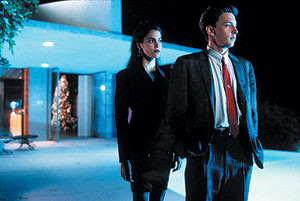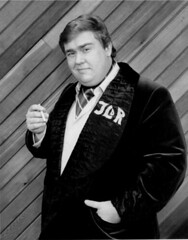Amid all the brouhaha surrounding Bret Easton Ellis' new novel, "Lunar Park," no one has asked my opinion about it. Since nobody asked, I'm going to tell it anyway.
I haven't read "Lunar Park," nor do I intend to. To all of his fans reading this, I admit that I've never read a Bret Easton Ellis novel, though I did get through the first five pages of "Bright Lights, Big City." Oops, wrong writer! I meant "Less Than Zero," of course. Five pages, front and back.
"Lunar Park" has generated quite a bit of press since its release, most of it negative. (For an excellent review, read Steve Almond's perspective in the Boston Globe.) A few critics have defended Mr. Ellis, who traffics in graphic sex, gore, and clothing labels. Ellis, who became famous with "Less Than Zero" way back in the 1980s, has (apparently) gotten grosser and nastier with each book, the apex (or nadir) of violence being "American Psycho."
Now, I could actually do some research, or even read "Lunar Park," and pretend that I have something substantial to say about the novel. However, there's precisely 2,395,087 books ahead of "Lunar Park" on the must-read list. I can't comment if the blood-and-screwing aspect to Ellis' work is brilliant commentary on social mores or sensationalistic crap. You won't hear me weighing in on his (reported) obsession with designer names, which (apparently) are meant to say something about our consumption-driven society.
But I am familiar with the man's career track, and anyone with a passing familiarity with Mr. Ellis can see a clear arc to his work. Note that I don't have any opinion on any of his books -- like I said, I haven't read them.
His career has been as improbable as it has been successful. Put yourself in his shoes, and you'll see what I mean.
Start out as a collegian with a modicum of writing talent and lots of ambition. A well-known author teaching an undergraduate class reads your tale of adolescent ennui in Los Angeles. The author helps get the manuscript -- christened "Less Than Zero" -- published to great fanfare. Critics are generally not moved, but because of your age and inexperience, they cut you some slack. The sensational aspects of the book are praised for their realism and cutting satire.
Unlike Bret, Andrew McCarthy didn't stay famous
Even the critics who don't like "Less Than Zero" think you've got major potential. Some go as far as saying you could be the new Voice of a Generation; you get lumped in other writers of lurid urban tales, say, Jay McInerney and Tama Janowitz. "Less Than Zero" sells a bazillion books and its wunderkind author gets a whopper movie deal.
So you're suddenly famous, rich, and barely of legal drinking age. And you write a second book, "The Rules of Attraction," which is similar to the first, simply moving the action from L.A. to a college campus. And it sells another bazillion copies. However, it doesn't quite generate the buzz as "Less Than Zero." Sure, there's another movie, and lots of dough, but fewer critics are hailing you as the voice of a new generation.
And then, several years later, your contemporaries start to drop out of the literary scene, one by one. Their books aren't hot anymore. Neither are yours. Suddenly, you're lumped with them, even if you're still publishing. No longer are you the Bad Boy of modern fiction. In fact, things are worse than getting bad reviews. People are forgetting about you.
But you're used to the attention, the partying, the models. So what do you do? Simple. You write "American Psycho," a book illuminating violence of such a grotesque nature that everyone from Michiko Kakutani to George Will writes about it -- they hate it, of course, but they're writing about it. Your star is shining bright again. "American Psycho" sells a few metric tons, and the producers of the film version cut you a seven-figure check.
Next step: "Glamorama," which partakes of the same themes as your other books -- except you're supposedly commenting on yourself, really, and the vapid world of models and blow that you've inhabited the past decade. The positive reviews are less than zero, but you're back on your best-seller game. The critics say that you've got some talent, sure, but it's all wasted on rote descriptions of exteriors and lacks any depth; you can spot a pair of $2,000 shoes, but can't examine the soul. Ms. Kakutani slams "Glamorama" in the N.Y. Times and you call the woman "Bitchiko" in a magazine interview, but never mind.
So there's your career up until now. What can you do to keep up the big 'mo? Start "Lunar Park" in the first-person as Bret Easton Ellis, writing a mea culpa for all the nasty sex n' gore you've peddled the past 20 years, then turn the narrative into a suburban phantasmagoria -- with all the nasty sex n' gore you've just disowned. You get to "comment" on the vicissitudes of literature and a society obsessed with sex and violence, all in one swipe.
Get a few positive reviews, get many negative ones. Don't worry about those naysayers. You've cracked the formula. Each book needs to be more attention-grabbing than the last, which means more sex, violence, and rhetorical tricks.
Congratulations. You've found your voice. Better yet, you've got an audience.
Is Bookfraud jealous of a career like that, with best-sellers and loyal readers? You betcha. Does my assessment have the whiff of disdain? All the way. Am I being objective, since I haven't read Ellis' work? No way in hell.
But like a friend once told me when I expressed a desire to be rich, in order to have Bill Gates' money, you have to be Bill Gates. In order to have the kinds of things Mr. Ellis has, you have to be a writer like Mr. Ellis. And that's just not going happen, even if I tried. I just don't have that kind of talent.
Thursday, August 25, 2005
Bret Easton Jealous
Subscribe to:
Comment Feed (RSS)


|